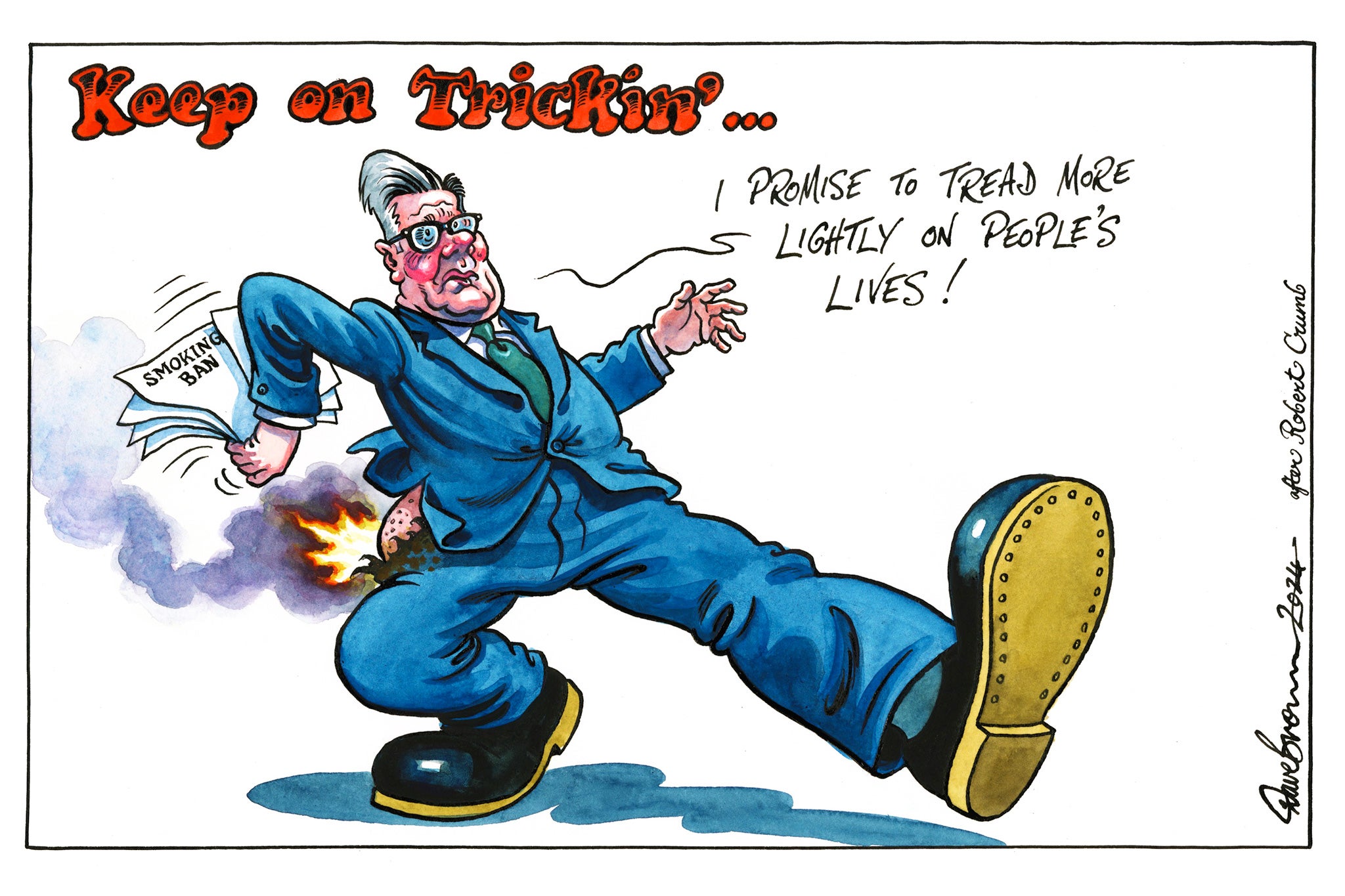Smoking is the single greatest cause of death in the UK. Some 80,000 people a year lose their lives because of it – all preventable, premature fatalities – and the morbidity it causes costs the NHS billions of pounds to treat, as well as inflicting terrible suffering on patients and grief on their families.
It is a scourge, and the rise in nicotine vaping may, on balance, be doing more harm than good. Obviously the world would be better off without tobacco, an extraordinarily addictive substance – the question is how to get there.
The latest, leaked, proposal from the government is to ban smoking from such prime outdoor locations as pub gardens, the area around football grounds, al fresco restaurant tables, and hospital premises. The forthcoming Tobacco and Vapes Bill will also revive the gradual raising of the legal age to buy tobacco products, a plan that was introduced by the Sunak administration but shelved because of Tory backbench dissent and the snap election.
These are the logical next steps in the gradual retreat of tobacco, a process that has been in train since the definitive link to lung cancer was established around the middle of the 20th century. A habit that was once commonplace, if not ubiquitous, is now a minority pursuit.
Advertising and sponsorship have been gradually curtailed to the extent that tobacco products are now hidden from view in supermarkets. Health warnings have become more graphic and prominent on packs. Smoking inside pubs and restaurants and on public transport has long been banned, and it takes an effort of memory to recall a time when passengers on planes were free to light up. Film noir was virtually defined by a private detective drawing hard on an untipped cigarette, having offered one to the client, as he considered the case in front of him.
Smoking was a simple and cheap pleasure, but punitive taxes and duties have since made it an expensive way to commit slow suicide. In the space of a few decades, tobacco has virtually disappeared from the lives of most people, stubbed out by health education, cost, and changing social attitudes.
Times change, and for the better, but there is usually a point at which every policy drive encounters diminishing returns. Past measures were, despite some grumbling, broadly accepted by the general public, including by smokers who yearned for help to kick the habit. This acquiescence was achieved by virtue of the case being so strong, and the downsides being regarded as a price worth paying – and that would include the loss of income, or even closure, for some pubs, working men’s clubs, eateries and nightclubs.
Would this necessarily be the impact of these latest proposals? There must be some doubt about that. Banning things on the grounds of public health usually commands a surprising degree of public support, which was a contributing factor in the success of such policies when most of the population indulged in the habit.
That isn’t so useful now that only about one in eight adults smokes, and the danger is that these draconian proposals would be difficult to enforce for, say, bar staff, or stewards at half-time at football grounds, and would therefore be more widely flouted than the existing rules.
It would be even harder to try to police smoking on the street in the vicinity of a public house. With the financial viability of an already hard-pressed pub sector already under threat, staff cannot be expected to patrol the streets outside for errant tobacco consumption – still less to seize a lit Superking from the lips of some poor wretch gasping in the drizzle.
As ever, some consent is needed for a law to be obeyed, and it would be unfortunate if the ban on outside smoking became as widely ignored as the laws on public littering. Fundamentally, if the extension of the ban on smoking were disregarded by the public, it would not save lives in any case; it would become the first failure in the war on smoking-related diseases.
In the current climate, it might be resented and resisted if it were regarded as another assault by the “metropolitan elite” on a working-class pleasure. It might even be more sensible to simply declare a ban on tobacco and make it a controlled substance because it is just as addictive and dangerous to health as some other, illegal substances. That would certainly be a more “honest” way forward, if rather fanciful.
The best approach would be to run some pilot schemes at selected or volunteering football and other stadiums, pubs, restaurants and so on, so that the consequences, intended and unintended, of the outdoor ban can be assessed before a national policy is enshrined in law. We can then have the same argument, but with more substantial evidence to hand.
It could be that it works as effectively as the bans on smoking indoors – or it could prove in practice to be worse than useless. As tobacco smoking reaches the fag end of its role in our lives, we should take some care as we try to stub it out for good.







Join our commenting forum
Join thought-provoking conversations, follow other Independent readers and see their replies
Comments